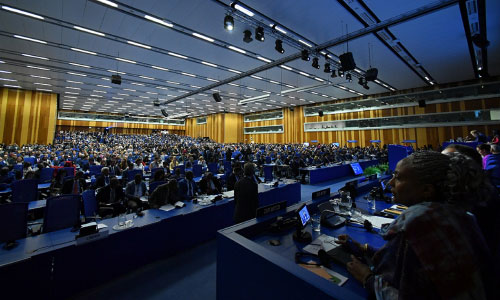IAEA - No other international organization offers the range of services related to nuclear science and technology that the IAEA does, Acting Director General Cornel Feruta said in his opening address to the IAEA’s 63rd General Conference today.
“We contribute to international peace and security by verifying that nuclear material remains in peaceful uses, and we help to improve the well-being and prosperity of the people of the world through the peaceful use of nuclear technology,” he told representatives of IAEA Member States at the start of the week-long annual meeting.
“We help countries on all continents to generate electricity, produce more food, manage their water supplies, combat deadly infectious diseases affecting humans, plants and animals, and treat cancer,” Mr Feruta added. “Our safeguards inspectors are on the road every day of the year, keeping track of nuclear material to verify that it is not diverted from peaceful activities. We serve as the global platform for cooperation in safety and security, helping countries to keep nuclear and radioactive material and technologies safe, and out of the hands of terrorists and other criminals.”
Noting the steady growth in the Agency’s membership to 171 countries and increasing demand for its services, Mr Feruta said: “The Agency has won the trust of Member States through our technical expertise, impartiality and independence.”
Progress in modernizing nuclear applications laboratories
This year saw the installation of the IAEA’s first linear accelerator at its Dosimetry Laboratory in Seibersdorf, Austria. This enables the Agency to provide expanded dosimetry calibration services to Member States to ensure that cancer patients undergoing radiotherapy treatment throughout the world receive exactly the right dose of radiation.
This was part of the modernisation of the IAEA nuclear applications laboratories, which the Acting Director General described as one of the most important projects ever undertaken by the Agency.
One of the first decisions of the General Conference at its opening session was to name one of the new laboratory buildings The Yukiya Amano Laboratories, in honour of the late Director General of the Agency, who died in July. “This is well-deserved recognition of the key role that DG Amano played in the modernisation of the IAEA nuclear applications laboratories,” Mr Feruta said.
Verification and monitoring in Iran
The IAEA continues to verify and monitor Iran’s implementation of its nuclear-related commitments under the Joint Comprehensive Plan of Action, and to verify the non-diversion of nuclear material declared by Iran under its Safeguards Agreement, Mr Feruta told delegates. Evaluations regarding the absence of undeclared nuclear material and activities in Iran continue.
“I continue to emphasize the importance of full and timely cooperation by Iran in the implementation of its Safeguards Agreement and Additional Protocol,” Mr Feruta added.
Expressing serious concern about the nuclear activities of North Korea, Mr Feruta said that the IAEA continues to monitor the country’s nuclear programme, including through satellite imagery. IAEA inspectors were required to leave North Korea in 2009.
Mr Feruta called upon North Korea, known officially as the Democratic People’s Republic of Korea, to comply fully with its obligations under relevant United Nations Security Council resolutions, to cooperate with the Agency and to resolve all outstanding issues.
“The Agency remains ready to play an essential role in verifying the DPRK’s nuclear programme if a political agreement is reached among countries concerned,” he said. (IAEA)
Home » World » Unique IAEA Nuclear Science and Technology Services Highlighted at 63rd General Conference
Unique IAEA Nuclear Science and Technology Services Highlighted at 63rd General Conference

